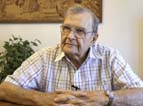Under Surveillance
By a recent disposition of the superior authorities, Lieutenant Mancuso, President of the War Veterans’ Association, has been nominated a member of the Directorate of the Fascio of Montreal and has been assigned to the office of propaganda and assistance. We congratulate Lieutenant Mancuso who is a most active element of our community and is always ready to cooperate in all patriotic manifestations.
October 27, 1934, article in L’Italia, referenced in RCMP files, “The Organization and Activities of the Italian Fascist Party in Canada,” Ottawa, 1937, Library and Archives Canada
Although one of fundamental principles of the Order is that it shall be non political, the Organization has been subjected to attempts of political influence. On looking back, one can see clearly, from a distance, how these attempts were planned. In 1934 a Grand Convention was held in Sault Ste. Marie to elect a new Grand Council of the Order. At that time and since, I believe, Italian Consuls attempted to put key men in all the Italian organizations in order to sway the opinions of their members in favour of the fascist regime; the Sons of Italy was not spared. Among the Grand Delegates present at Sault Ste. Marie was a certain Tommaso Mari, journalist, who forsed [sic] his way, I am told, to represent Lodge “Ontario” of Toronto. As I now understand Sabetta should be elected Grand Venerable of the Order, because the then Grand Venerable, Nicola Masi, or any other in the ranks, did not suit him. The Grand Delegates, not being aware of Mari’s scheme elected Dr. Sabetta Gran [sic] Venerable and Tommaso Mari himself Grant Orator; these are the two most important Offices in the Grand Council. Since then, I believe, Dr. Sabetta has always been obliging towards the Italian Consuls.
Rev. Libero Sauro, document, Facts About The Order Of Sons of Italy of Ontario Mutual Benefit Society, Columbus Centre Collection
Had the authorities who are responsible for the employment of [Bersani] been aware of his character, I am sure he would not have been taken into their service as a [Secret Agent], as they would never allow the great reputation of the Royal Canadian Mounted Police to be sullied
Justice Hyndman, letter to Minister of Justice Ernest Lapointe, December 3, 1940, Library and Archives Canada
Lists of Italian Canadians to be interned in the event of war had been compiled by the Royal Canadian Mounted Police (RCMP) well in advance of June 1940. In part, this information was obtained by reading the fascist press in Canada. Fascists had attempted to take control of Italian cultural and benevolent societies, such as the Order Sons of Italy (OSI), with the aid of Italian consuls. The reports of the OSI in fascist newspapers painted the entire organization and its members as fascists, but this was not the case.
The quality of the evidence against internees ranged from strong to weak. Some were seen in photographs wearing black shirts while others had more tenuous links to fascist activity, such as playing for a baseball team organized by the Dopolavoro.
Even the internment of active fascists was inconsistent. Montreal’s Gentile Dieni, whose fascist convictions led him to enlist in the Fasci Italiani all’Estero division and fight in Ethiopia, spent more than three years in camp. Yet, Etelvina Frediani, a fiduciary of the Toronto Fascio Femminile, whose fascist activism interfered with her ability to hold down a job, was not interned.
Informants
The RCMP also used informants to identify suspected fascists. These individuals belonged to the Italian Canadian community. Their motivations varied. Some gave information to authorities because of their anti-fascist convictions. Others sought to gain favour for the release of interned family members. In at least one instance, an informant sought revenge against a personal slight.



